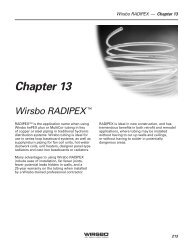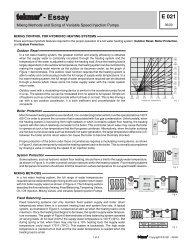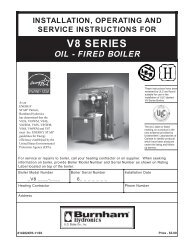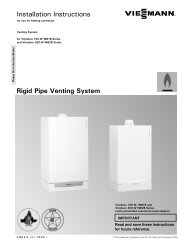Steam Locomotive Firebox Explosion on the Gettysburg Railroad ...
Steam Locomotive Firebox Explosion on the Gettysburg Railroad ...
Steam Locomotive Firebox Explosion on the Gettysburg Railroad ...
Create successful ePaper yourself
Turn your PDF publications into a flip-book with our unique Google optimized e-Paper software.
was that it was built up<strong>on</strong> ei<strong>the</strong>r misunderstood<br />
instructi<strong>on</strong>s or misinformati<strong>on</strong> that<br />
had come sec<strong>on</strong>d- or third-hand from a certified<br />
or professi<strong>on</strong>al commercial-railroad<br />
source. Thus, misunderstood, incomplete, or<br />
incorrect informati<strong>on</strong> was c<strong>on</strong>tinually passed<br />
<strong>on</strong> until it became <strong>the</strong> norm. Therefore, <strong>the</strong><br />
Safety Board c<strong>on</strong>cludes that <strong>Gettysburg</strong> Passenger<br />
Services had no effective formal<br />
training or certificati<strong>on</strong> program and that its<br />
OJT was dependent <strong>on</strong> sec<strong>on</strong>d- and thirdhand<br />
expertise.<br />
Progressive Crown-Stay Failure--Although<br />
not a warning or preventative device, <strong>the</strong> design<br />
of <strong>the</strong> accident locomotive boiler<br />
appeared to mitigate <strong>the</strong> effects of <strong>the</strong><br />
crownsheet failure. As previously discussed,<br />
<strong>the</strong> locomotive had alternating rows of<br />
straight-thread and butt<strong>on</strong>-head crown stays<br />
to help ensure that any crownsheet failure<br />
due to low water would occur relatively<br />
gradually and in stages, ra<strong>the</strong>r than instantaneously<br />
and catastrophically.<br />
The design was suggested in <strong>the</strong> 1922<br />
Master Boiler Associati<strong>on</strong> manual report. It<br />
appears to have been unique to <strong>the</strong> Canadian<br />
<str<strong>on</strong>g>Locomotive</str<strong>on</strong>g> Company, Ltd. and may well<br />
have prevented a more sudden catastrophic<br />
failure of <strong>the</strong> crownsheet, which could have<br />
sent <strong>the</strong> boiler rocketing off <strong>the</strong> frame,<br />
killing or injuring <strong>the</strong> crew and passengers.<br />
The Safety Board believes such a design<br />
may be worthy of fur<strong>the</strong>r study for<br />
incorporati<strong>on</strong> in steam locomotives when<br />
<strong>the</strong>y are repaired or rebuilt. The Safety<br />
Board also believes that <strong>the</strong> FRA, in<br />
cooperati<strong>on</strong> with <strong>the</strong> NBBPVI and <strong>the</strong><br />
tourist-railroad industry steam-locomotive<br />
operators should explore <strong>the</strong> feasibility of<br />
requiring progressive crown-stay failure<br />
features in steam locomotives.<br />
<str<strong>on</strong>g>Steam</str<strong>on</strong>g>-<str<strong>on</strong>g>Locomotive</str<strong>on</strong>g> Maintenance Expertise--<br />
The Safety Board is c<strong>on</strong>cerned that <strong>the</strong><br />
incorrect injector disk, <strong>the</strong> leaking check<br />
valve, <strong>the</strong> missing feed-pump gage, <strong>the</strong><br />
inoperative dynamo, and <strong>the</strong> n<strong>on</strong>functi<strong>on</strong>ing<br />
water-glass light toge<strong>the</strong>r reflect<br />
a disturbing pattern of poor maintenance<br />
and/or improper repair. Such maintenance,<br />
in <strong>the</strong> opini<strong>on</strong>s of <strong>the</strong> investigati<strong>on</strong> steamlocomotive<br />
experts, clearly indicated a lack<br />
of knowledge and expertise <strong>on</strong> <strong>the</strong> part of<br />
<strong>the</strong> locomotive owners and crew. As<br />
previously noted, steam-locomotive<br />
expertise is g<strong>on</strong>e from most modern<br />
commercial railroads, and generally <strong>on</strong>ly a<br />
small number of experts and a limited<br />
supply of knowledge and skill remain.<br />
Today, many operating steam locomotives<br />
are in <strong>the</strong> hands of a generati<strong>on</strong> who have<br />
had to develop steam-locomotive maintenance<br />
and operati<strong>on</strong> sec<strong>on</strong>d- or third-hand,<br />
much like <strong>the</strong> pers<strong>on</strong>nel of <strong>Gettysburg</strong><br />
Passenger Services. One way to establish a<br />
minimum level of steam-locomotive expertise<br />
and <strong>the</strong>reby better ensure <strong>the</strong> safety<br />
of operators and <strong>the</strong> public would be to<br />
establish an educati<strong>on</strong> and certificati<strong>on</strong><br />
program that establishes and enforces basic<br />
standards for steam-locomotive operati<strong>on</strong><br />
and maintenance.<br />
The NBBPVI and <strong>the</strong> tourist-railroad industry<br />
steam-locomotive operators have<br />
agreed to establish a program for <strong>the</strong> safe<br />
maintenance and operati<strong>on</strong> of boilers. The<br />
Safety Board supports such efforts and believes<br />
that <strong>the</strong> FRA, in cooperati<strong>on</strong> with <strong>the</strong><br />
NBBPVI and <strong>the</strong> tourist-railroad industry<br />
steam-locomotive operators, should develop<br />
certificati<strong>on</strong> criteria and require steam-locomotive<br />
operators and maintenance pers<strong>on</strong>nel<br />
to be periodically certified to operate<br />
and/or maintain a steam locomotive.<br />
46
















